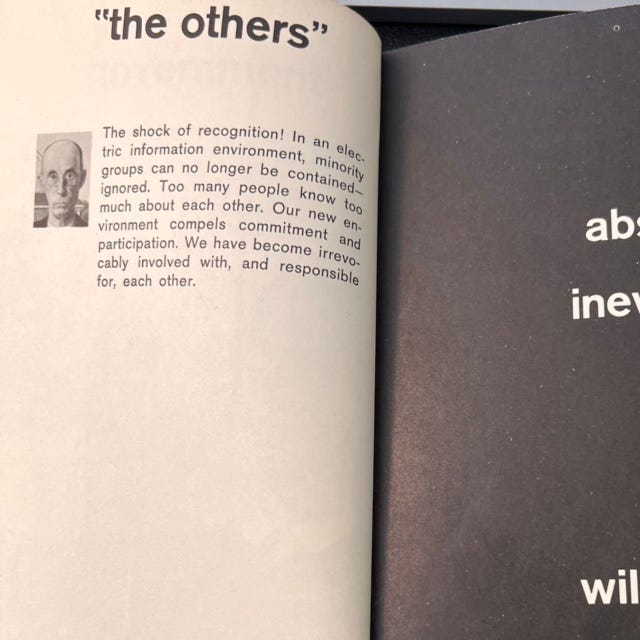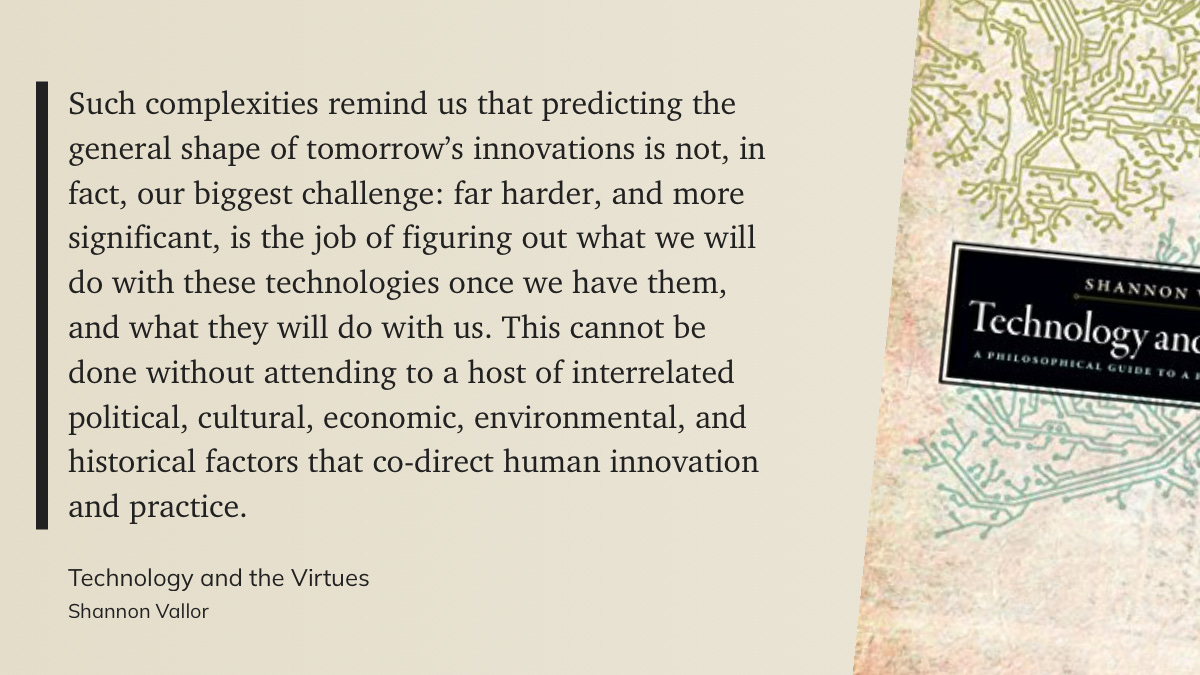The Post-Evangelical Post currently exists as a one-person publication. In that spirit, I am launching a new vertical today called Shaped by Tools. It will explore how using digital technologies & platforms effect us as people and impact our social institutions.
I don’t know how Marshall McLuhan did it, but he described what it was like to be Extremely Online™ in 1967.
In a series of pages from his book The Medium is the Massage: An Inventory of Effects (co-written & designed by Quentin Fiore), McLuhan describes how the transition from a primarily literate society (ushered in by the printing press) to what we’d now call a “digital first” society has effected various spheres of life:
you
your family
your neighborhood
your education
your job
your government
“the others”
His comments about each sphere are prescient. For instance, under “you,” he writes:
“The older, traditional ideas of private, isolated thoughts and actions—the patterns of mechanistic technologies—are very seriously threatened by new methods of instantaneous electric information retrieval, by the electrically computerized dossier bank—that one big gossip column that is unforgiving, unforgetful and from which there is no redemption, no erasure of early “mistakes.”
If that doesn’t describe the experience of “cancel culture,” well.
But in the past decade, as social platforms like Twitter, Instagram, and TikTok have become fully engrained in our social fabric, I am particularly blown away by his description of “the others:”
“The shock of recognition! In an electric information environment, minority groups can no longer be contained—ignored. Too many people know too much about each other. Our new environment compels commitment and participation. We have become irrevocably involved with, and responsible for, each other.”
As I read this passage from the 1960s, another period of increased social awareness about inequality and injustice here in the United States, I see echoes of our own contemporary experience since around 2014, when the events surrounding the murder of Michael Brown in Ferguson, MO and all the events that have transpired since then.
The 1960s Civil Rights movement utilized TV and radio, the new & established media of their time, to show white America aspects of society they would rather ignore. Similarly, social media has made it possible for even more people to speak about their experiences using tools like Twitter & TikTok to shine lights on stories that would have been overlooked.
But those words—“too many people know too much about each other”—they ring true today. If anything, they are more poignant now, in an era where sharing has become a default mode for many people, and even those who do not share or post participate in the consumption of the stories people post online. We absorb one another’s emotions, relentlessly compare ourselves to others, and have to constantly check in with ourselves in order to know if it’s healthy for us to use these services because we’ve developed codependent relationships with people we don’t even know or don’t even know we have imputed this burden onto them.
And the next line: “Our new environment compels commitment and participation.” In that, I see the impulse for us to act as our own PR reps, to constantly “update our followers” on what they can expect regarding changes to our content calendars—and somehow, this expectation feels universal, regardless if it is our full-time job, regardless of whether or not there’s a lingering pandemic and a subtle background dread tinted with economic precarity & climate apocalypse.
All of this leads to another insight from The Medium is the Massage:
All media are extensions of some human faculty—psychic or physical. The wheel is an extension of the foot; the book is an extension of the eye; clothing, an extension of the skin; electric circuitry, an extension of the central nervous system.
I feel the truth of this more than I comprehend it. When I read these words, I understand why people and events that are so far away can feel so close, so intimate, so immanent.
And I wonder if the product designers and coders and business leaders who form these tools that have become so central to our lives—especially as we enter YEAR THREE of a global pandemic that forces us to rely on them more and more—recognize the responsibility they have assumed. Recent reports & statements indicate they do not.
These are not simple issues or questions. Cultivating a sense of what the philosopher of technology Shannon Vallor calls “technomoral virtue ethics” is a social imperative. This thread will be woven into my own book, and into my own writing here.
If all the “metaverse” hype is to come to pass in the next few years, we stand on the precipice of another computing paradigm shift even though we have seemingly failed to learn from the hard lessons of the current one. Yet I take solace in another McLuhanism: there is absolutely no inevitability as long as there is a willingness to contemplate what is happening.
“Progress,” that vague term that benefits the incumbent, is inevitable. What that progress looks like is not. I endeavor to contemplate how tools can make us more human, more just, and more equal & secure.
Thanks for reading. If you’re interested in McLuhan’s ideas, one entry point to them is this absolutely wild album that he helped create in conjunction with his book. The fact that this is edited the way it is and was created in 1967 is a technical & artistic feat. It’s embedded below.






“Too many people know too much about each other”. Whoomp, there it is. Wow.
As for the point about electrical circuitry being an extension of the central nervous system: I heard a great description on a podcast recently of how we now "all have an emotion-inducing device which we carry around with us the whole time". It made me realise how I'd misread social media, Twitter in particular, as being an *information-providing* system. It is and has been that, but it's also (and often more importantly) an *emotion-inducing* system. This is something I've only fully appreciated rather too late – with a consequent toll on my mental health that is far greater than I'd realised. (And that, children, is how I came to delete my Twitter in November.)
Wow those words from the past ring true.